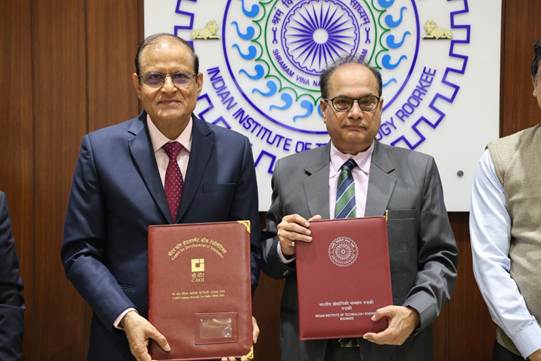TEC signs MoU with SRMIST to boost indigenous telecom R&D and global standardisation

The MoU was signed on 13 November 2025 by Amit Kumar Srivastava, DDG (Mobile Technologies), TEC, and Dr S. Ponnusamy, Registrar, SRMIST, in the presence of Pawan Gupta, DDG (Admin.), TEC; Prof. C. Muthamizhchelvan, Vice Chancellor, SRMIST; and Dr Revathi Venkataraman, Professor and Chairperson, School of Computing, SRMIST, at the institute’s Kattankulathur campus.
Partnership aims to advance Atmanirbhar Bharat through collaborative studies in 6G, AI, quantum communication, NTNs and next-generation telecom standards.
New Delhi, November 14: The Telecommunication Engineering Centre (TEC), the technical arm of the Department of Telecommunications (DoT), has signed an MoU with the SRM Institute of Science & Technology (SRMIST) to collaborate on joint studies, advanced telecom research, and global standardisation initiatives. The agreement marks a significant step toward strengthening India’s presence in international standard-setting bodies and accelerating indigenous telecom innovation.
The partnership will focus on developing India-specific standards, test frameworks, and future network technologies spanning 6G, Artificial Intelligence, Non-Terrestrial Networks (NTN), quantum communication, optical systems, cybersecurity, and distributed intelligence. It will also support India’s deeper participation in international forums such as ITU-T, ITU-R, ITU-D, and relevant 3GPP working groups.
The MoU was signed on 13 November 2025 by Amit Kumar Srivastava, DDG (Mobile Technologies), TEC, and Dr S. Ponnusamy, Registrar, SRMIST, in the presence of Pawan Gupta, DDG (Admin.), TEC; Prof. C. Muthamizhchelvan, Vice Chancellor, SRMIST; and Dr Revathi Venkataraman, Professor and Chairperson, School of Computing, SRMIST, at the institute’s Kattankulathur campus.
Advancing India’s next-generation telecom roadmap
The collaboration establishes a formal mechanism for TEC and SRMIST to jointly develop research models, contribute to international study groups, and accelerate the development of indigenous IP in critical telecom areas.
Key domains of joint research include:
- 6G technologies such as AI-driven resource allocation, low-latency coding, and computation-aware networking
- Digital Twins for network behaviour modelling and optimisation
- Quantum communication and quantum-assisted 6G architectures
- Edge AI and distributed intelligence for real-time analytics and automation
- Generative AI, LLMs, and federated learning for network automation
- Cybersecurity for resilient and secure communication networks
- RF, microwave, terahertz, mmWave and cognitive radio systems
- Optical and optical-wireless communication systems
- Non-Terrestrial Networks (NTNs) integrating satellite, terrestrial, and HAPS systems
- Open RAN and network disaggregation for interoperable, software-driven networks
Strengthening India’s global influence
By strengthening India’s technical contributions to ITU and 3GPP, the partnership is expected to increase India’s influence in global standardisation processes—a critical enabler for the country’s strategic technology autonomy.
The MoU directly supports the Atmanirbhar Bharat mission by enhancing indigenous research and reducing dependence on imported telecom technologies. It also aims to build a robust ecosystem for domestic telecom design, manufacturing, and innovation.
About TEC
The Telecommunication Engineering Centre (TEC) is the DoT’s technical body responsible for developing standards, specifications, and conformity assessment frameworks for Indian telecom networks. TEC represents India in ITU-T, ITU-R, and coordinates national working groups for global standardisation activities.
About SRMIST
The SRM Institute of Science and Technology is a leading research-focused institution with strong capabilities in Artificial Intelligence, Cybersecurity, Advanced Telecommunications, Quantum Communications, and emerging ICT domains. Established in 1985, SRMIST is located in Kattankulathur near Chennai.








